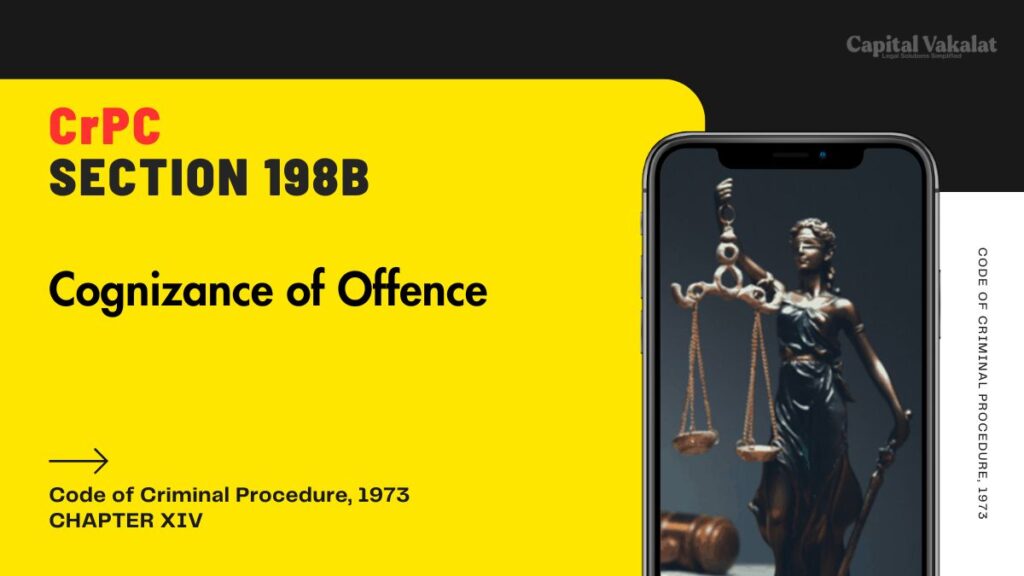The Indian legal system, renowned for its intricate and exhaustive framework, often presents complexities that require thorough understanding. One such provision, Section 198B of the Criminal Procedure Code (CrPC), pertains to the cognizance of specific offences.

This section encapsulates the procedures and prerequisites for taking legal action against certain crimes, ensuring justice is served within the bounds of law.
Bare Act. Section 198B Cr.P.C.
Cognizance of offence.
[No Court shall take cognizance of an offence punishable under section 376B of the Indian Penal Code (45 of 1860) where the persons are in a marital relationship, except upon prima facie satisfaction of the facts which constitute the offence upon a complaint having been filed or made by the wife against the husband.]
1. Ins. by Act 13 of 2013, s. 19 (w.e.f. 3-2-2013).
Section 198B CrPC: Cognizance of Offence
Section 198B of the CrPC deals with the cognizance of offences related to marital relationships. It specifically addresses offences under sections 494 and 495 of the Indian Penal Code (IPC), which involve bigamy. The procedural specifics of this section ensure that complaints regarding bigamy are scrutinized and handled appropriately, maintaining the sanctity of marital laws in India.
Historical Context and Evolution
The incorporation of Section 198B into the CrPC was necessitated by the increasing need to address marital offences more rigorously. Historically, bigamy has been a contentious issue in India, with numerous cases highlighting the need for a structured legal approach. The amendment of the CrPC to include this section was a significant step towards empowering victims of bigamy, providing them with a legal avenue to seek redress.
Legal Framework and Interpretation
The legal framework of Section 198B CrPC outlines that no court shall take cognizance of an offence punishable under section 494 or section 495 of the IPC except upon a complaint made by some person aggrieved by the offence. This means that only those directly affected by the act of bigamy can file a complaint, ensuring that the legal process is not misused by unrelated parties.
Procedural Aspects of Section 198B CrPC
The procedural requirements under Section 198B ensure that the complaint is substantiated with sufficient evidence. The complainant must provide detailed information regarding the alleged offence, including proof of the existing marriage and the subsequent illegal marriage. This meticulous approach prevents frivolous complaints and ensures that the legal system is not burdened with unsubstantiated claims.
Implications for Marital Offences
The implications of Section 198B CrPC are profound, particularly for women who are often the victims of bigamy. By providing a clear legal pathway for addressing such offences, this section empowers women to seek justice and uphold their marital rights. The provision also serves as a deterrent for individuals contemplating bigamy, knowing that the legal repercussions are stringent and unavoidable.
Case Studies and Judicial Interpretations
Several landmark cases have highlighted the application and significance of Section 198B CrPC. In these cases, the judiciary has reiterated the importance of adhering to the procedural requirements outlined in this section. The judgments have underscored the need for substantial evidence and the aggrieved party’s direct involvement, reinforcing the section’s intent to provide a fair and just legal process.
Comparative Analysis with Other Jurisdictions
A comparative analysis reveals that the approach towards bigamy and marital offences varies significantly across different jurisdictions. While some countries have stringent laws similar to Section 198B CrPC, others adopt a more lenient stance. Understanding these differences highlights the progressive nature of India’s legal framework in addressing marital offences comprehensively.
Challenges and Criticisms
Despite its robust framework, Section 198B CrPC is not without its challenges and criticisms. One of the primary concerns is the difficulty in gathering evidence to substantiate claims of bigamy. Additionally, there are instances where the aggrieved party may face societal pressures or threats, deterring them from pursuing legal action. Addressing these challenges requires continuous legal reforms and support systems to assist victims in navigating the legal process.
Role of Legal Practitioners
Legal practitioners play a crucial role in the effective implementation of Section 198B CrPC. Their expertise in navigating the complexities of marital offences ensures that victims receive proper legal counsel and representation. By understanding the nuances of this section, lawyers can provide strategic advice and support to their clients, ensuring that justice is served.
Advocacy and Awareness
Raising awareness about Section 198B CrPC is essential for its effective implementation. Advocacy groups and legal organizations must work together to educate the public about their rights and the legal recourse available for marital offences. Increased awareness can empower victims to take action and seek justice, thereby upholding the principles of equality and justice enshrined in the Indian Constitution.
Conclusion
Section 198B CrPC is a critical provision in the Indian legal system, addressing the cognizance of bigamy-related offences. Its comprehensive framework ensures that victims have a clear legal pathway to seek justice, while also serving as a deterrent against such offences. Despite its challenges, the effective implementation of this section, supported by legal practitioners and advocacy groups, can uphold the principles of justice and equality in marital relationships.